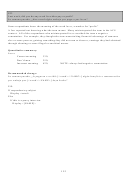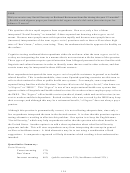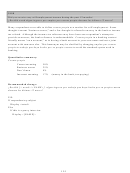Survey Methodology #2003-17 - The American Community Survey (Acs) En Espanol: Using Cognitive Interviews To Test The Functional Equivalency Of Questionnaire Translations - U.s. Bureau Of The Census Page 11
ADVERTISEMENT
Results suggest the need to pretest questionnaire translations in order to ensure functional
equivalence of questionnaire translations. Results from these cognitive interviews identified a
series of conceptual and interpretive problems with key terms and questions, and helped
document salient issues that may be attributed either to linguistic or questionnaire design issues.
The findings are not reflective of inadequate translations, or poor translation techniques, but
rather point to issues that may become apparent only through pre-testing.
METHODOLOGY
Three bilingual researchers from the Census Bureau, the National Center for Health Statistics,
and a private contractor completed a total of 35 face-to-face interviews between January and
February 2002 in California, Illinois, Maryland, and Texas. The researchers used Spanish
questions as they appear in the American Community Survey (ACS) computer-assisted personal
interview (CAPI) instrument. The ACS provides demographic and socio-economic data as well
as housing profiles.
The ACS has three methods of data collection. First, households are asked to complete a paper-
and-pencil (PAPI) instrument using mail-out/mail-back methodology.
Computer-assisted
telephone interviewing (CATI) methodology is used for households that do not return their PAPI
questionnaire. A final attempt is made to collect data for missing households using computer-
assisted personal interviewing (CAPI) methodology. Like other demographic surveys, the ACS
CAPI instrument was first developed in English (source document), and then translated by
private contractors.
5
ADVERTISEMENT
0 votes
Related Articles
Related forms
Related Categories
Parent category: Legal
 1
1 2
2 3
3 4
4 5
5 6
6 7
7 8
8 9
9 10
10 11
11 12
12 13
13 14
14 15
15 16
16 17
17 18
18 19
19 20
20 21
21 22
22 23
23 24
24 25
25 26
26 27
27 28
28 29
29 30
30 31
31 32
32 33
33 34
34 35
35 36
36 37
37 38
38 39
39 40
40 41
41 42
42 43
43 44
44 45
45 46
46 47
47 48
48 49
49 50
50 51
51 52
52








